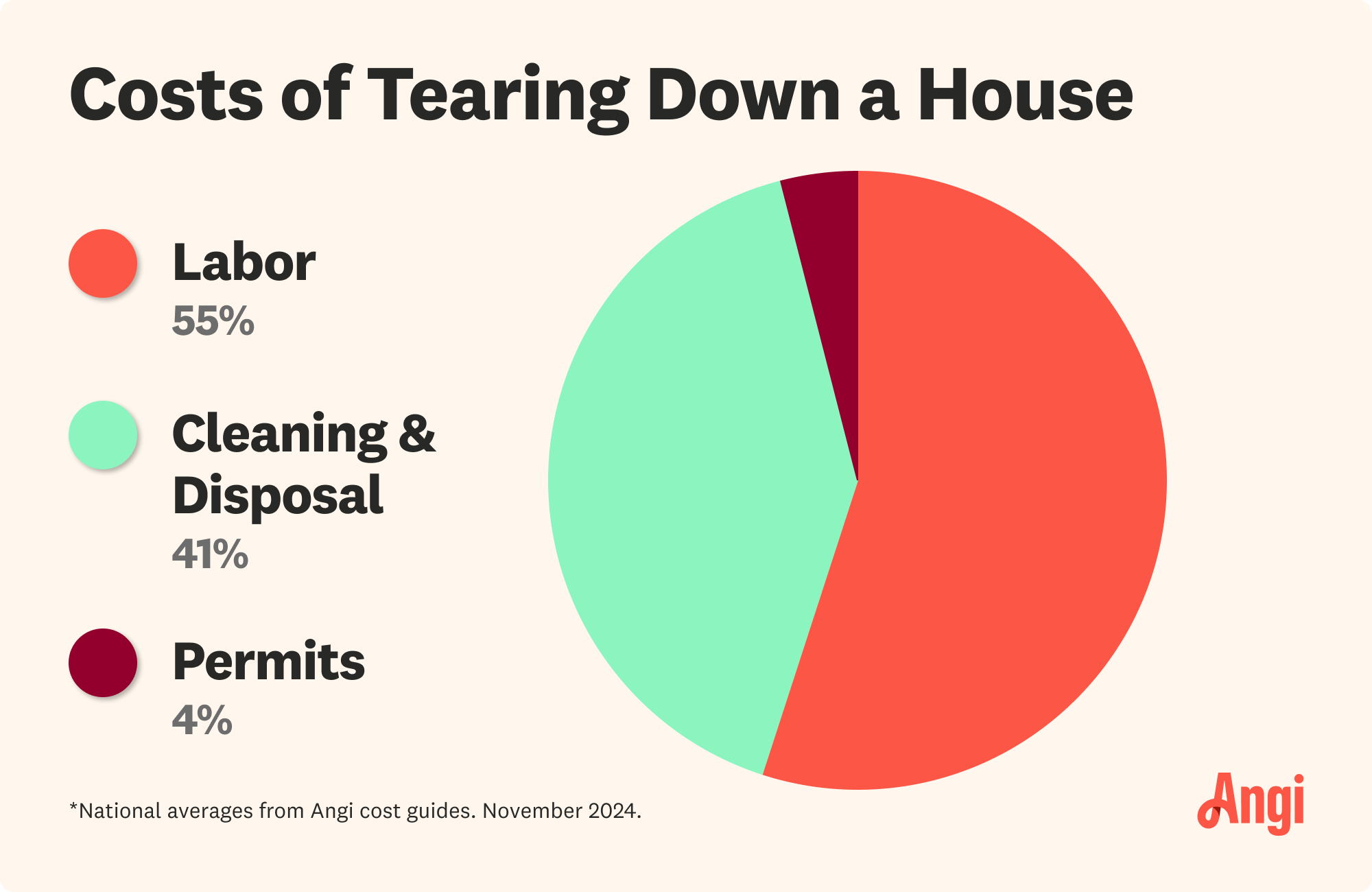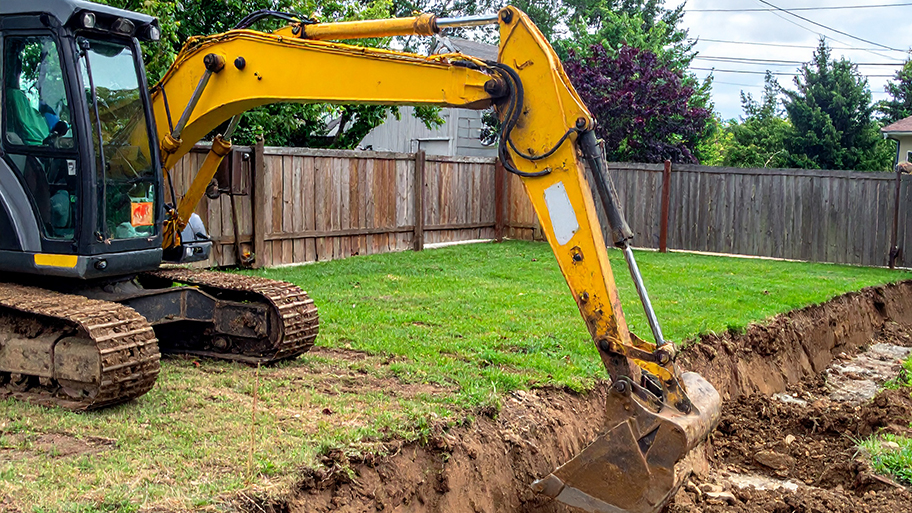
If you’re building a new home, you might need to consider the cost of digging out a basement. Use this pricing guide to get an estimate for the project.
Excavation costs depend on your project and location. Check with a local pro for your specific job.
The most significant cost factors are the size of your house, accessibility, and the type of foundation you need to demolish.
You’ll pay between $4 and $17 per square foot to demolish a residential structure.
Remember to budget for a demolition permit, which adds between $100 and $500 to your total.
Your price can increase significantly if you have known hazardous materials, like asbestos shingles, to dispose of after the demo.
The cost to demolish a house is $15,800 for an average 2,000-square-foot home, although prices can range from $4,800 to $50,000 depending on the size of the house, whether you’re in a more rural or urban location, the materials you’re tearing out, machinery costs, and more. Because size plays a huge role in determining the cost, you can expect to spend $4 to $17 per square foot for demolishing costs.
Prices to demolish a home range from $4 to $17 per square foot. A professional home demolition service near you will be able to give you a quote, but here's how much you can expect to pay based on home size:
| Size | Average Cost |
|---|---|
| 1,200 square feet | $4,800–$20,400 |
| 1,500 square feet | $6,000–$25,500 |
| 2,000 square feet | $8,000–$34,000 |
| 2,500 square feet | $10,000–$32,500 |
| 3,000 square feet | $12,000–$51,000 |

The cost to demolish a house depends on how big the house is, where it’s located, and the labor prices in your area. Here are the main factors to consider as you plan your project.
The more square footage, the higher the cost of the demolition. Larger homes require more time and tools, and there are more materials to dispose of. The median cost of demolishing a 1,500-square-foot home is $15,570, whereas the median cost for a 2,500-square-foot house is $21,250.
Tearing down a home in the city is far more expensive than in a rural area. Demolishing a 1,500-square-foot home can run from $6,000 in rural areas to $25,500 in densely populated cities. It’s easier to access a rural home, whereas a dense urban setting requires careful setup and cleanup.
No matter where the house you’re demolishing is located, you’ll need to check in with the local government and find out what types of permits are needed before starting. Often, demolition permits require water, sewer, and gas lines to be capped off in advance so they aren’t damaged in the process. You need to pay for a plumber, gas company, and other local professionals to get that done before demolition. Permits average between $50 and $100 each, so it’s important to include them in your project budget.
The cost of labor differs dramatically based on your area and the cost of living. Contractor rates range from $50 to $100 per hour depending on where you live and what your demo involves, although most projects are priced per square foot. In general, large metropolitan areas tend to have higher wages than rural locations. Busy construction seasons can also raise labor prices.
Some contractors include cleanup and disposal in their quote, but be sure to check your itemized contract before signing—the average cost ranges from $300 to $1,800. If your home has asbestos, you might have to pay an added cost to dispose of the asbestos properly, which averages about $2,000.
If your contractor doesn’t include disposal in your project, you’ll need to take care of this crucial step yourself. Demolition comes with an enormous amount of waste, and you have to be responsible for the proper disposal of all materials. Sometimes, hiring a local waste removal company is the best call, as they’ll handle the hard work for you. Other times, you may want to rent a dumpster to toss all the debris into over a longer period of time.
Junk removal costs anywhere from $60 to $600 depending on the volume and materials you’re parting with, while dumpsters cost an average of $380 per week.
Depending on how you demo the house, your contractor might use machinery such as forklifts and sledgehammers. The cost of the machinery and skilled labor to operate it can impact the project’s cost. Equipment rental cost, such as the cost to rent an excavator or a bulldozer, is around $100 to $250 per hour with an operator, but most contractors factor in machinery costs when setting their price per square foot.
The time of year you decide to schedule demolition work could also impact the cost. Excavating in the winter or tearing down a house on a scorching summer day could create more challenging work conditions, which means you’ll pay more for machinery rentals and labor. On the other hand, you may find better deals in cold weather, when excavation companies have fewer projects on the books.
A demolition removes the structure altogether and often involves the cost of machinery. Deconstruction focuses on salvaging reusable materials. Machinery isn’t usually needed, but the project costs much more in labor due to the extra time involved. Your deconstruction cost might be on the higher end of the price per square foot in your area. You may be able to qualify for a tax write-off if you deconstruct instead of demolish.
Demolishing your home may include more than just the house itself. From removing a deck to excavating the yard, there are many parts of your property that you may want to remove. Consider any additional structures on your property that may need to go, too—and the permits you’ll need to do it all.
| Additional Demolition Factors | Average Cost |
|---|---|
| Permits | $100–$500 each |
| Foundation | $1,000–$5,000 |
| Deck | $5–$15 per square foot |
| Driveway | $1–$2 per square foot |
| Swimming pool | $13–$15 per square foot |
| Garage | $4–$10 per square foot |
The type of home you have definitely impacts what you’ll pay to demolish the house. Here’s what to expect.
| Structure Type | Average Cost |
|---|---|
| Traditional home | $4,800–$34,000 |
| Mobile home | $3,000–$7,000 |
| Shed or barn | $250–$3,000 |
While the average cost of a full demolition on a house ranges from $4,800 to over $34,000, other structures are much less expensive to bring down. Also, some people choose deconstruction over demolition, which is more environmentally friendly, as it involves taking a traditional house apart piece by piece and salvaging as much as possible.
The cost to demolish a mobile home averages $4 per square foot, so a home that’s 15 feet by 50 feet should cost somewhere around $3,000. Many people who demolish their mobile homes walk away with some profit by selling the sheet metal they’re made from.
Shed removal costs $250 to $3,000, or you may be charged by the hour. If you pay per hour, dismantling a shed or barn will come with an hourly rate between $50 and $100. Since sheds are often small, they usually only take a few hours to demolish, whereas a barn can run larger in size but is usually constructed from wood, which comes down easily.
Depending on how big your project is, there are a few additional items you may want to keep in mind as you’re calculating your budget.
Basement demolition costs depend on what your basement floor is made of, as well as the square footage and number of materials that need removing. If you are digging out a basement made of concrete, or the floor needs leveling, it will be more costly to demolish. On average, basement demolition ranges from $300 to $4,000 for a small home and $5,000 to $25,000 for a larger home.
You may want to expand your demolition project into a renovation project by rebuilding the home or room on site. This means swapping out your hired demolition crew for a local interior or home remodeling crew to finish the job. Include home renovation costs in your budget, which can average $50,200 for a whole house.
You may be aware (or surprised) to know that there could be asbestos hidden in the walls of your home. This material is highly dangerous, and it’s common in homes that were built before the 1980s. Asbestos removal should always be performed by a professional in protective gear to avoid inhaling its particles or making skin contact. There are companies that specialize in asbestos removal services, which you can call to handle that portion of the demolition.
The cost to demo a home’s interior is much more affordable than razing your entire house. Ask demolition contractors about a partial demolition if most of your home is usable. This lets you redo your home without starting at the foundation.
Choosing just to remove some interior walls to open up space in your home is a very cost-effective alternative to full demolition. You can get the open layout of your dreams without changing your home's exterior look.
If you'd like to keep a demolition project under $10,000, consider just tearing down a garage that is making your home outdated. The cost to demolish a garage ranges from $2,000 to $10,000 for most homeowners. This can also protect your home from any rot in a deteriorating garage.
If you're ready to spend $22,000 or more, you're in the wheelhouse of a full demolition. From here, you'll have a clean slate for a rebuild. While pricey, it can be much cheaper than purchasing a new plot of land to build on.
While you may be able to shave off labor costs equaling 50% to 60% of this project's total by going DIY, those savings are often eaten up by the magnitude of the equipment you'll need to rent if you attempt to DIY a home demolition. On average, the cost for the demolition trucks, forklifts, and sledgehammers needed can total anywhere from $500 to $3,000. In addition to managing the high costs of DIY home demolitions, homeowners attempting to tear down a property can also face challenges with zoning and permitting. That's why letting a local home demolition pro near you handle this project from inception to finish is so highly recommended.
Home demolition is a dangerous and complex project. Here's why it's best left to the pros:
Destabilizing a heavy, multi-ton structure can be dangerous.
DIY homeowners can struggle with deactivating things like oil hookups, gas lines, and electrical connections that pose fire risks to the entire neighborhood.
Homeowners attempting this project on their own don't have the same contractor insurance that offers protection for these types of jobs.
For homes built before the 1980s, the U.S. Environmental Protection Agency (EPA) has strict rules regarding asbestos that many homeowners are unaware of.
Improper preparation and handling of this project could release toxic fumes and particles into the air that can harm your health and create legal liabilities.
While knocking down your home isn't something you should do alone, there are some preparation and cleanup steps you can take care of to reduce the overall cost:
Remove all furniture, personal items, and salvageable materials from the home.
Remove drywall, doors, windows, frames, and flooring materials from throughout the home.
Remove toilets, built-in showers, and other heavy fixtures yourself.
Rent a dumpster to handle debris removal on your own after demolition.
Gather information about the year your home was built to confirm if asbestos remediation is necessary before demolition.
Discuss full or partial demolition.
Discuss plans for preserving any landscaping or historic structures adjacent to the home being demolished.
Be prepared to discuss the legal requirements for disposing of demolition debris with a professional.
Home is the most important place on earth, which is why Angi has helped more than 150 million homeowners transform their houses into homes they adore. To help homeowners with their next project, Angi provides readers with the most accurate cost data and upholds strict editorial standards. We extensively research project costs to develop the pricing data you see, so you can make the best decisions for you and your home. We rely on reputable sources, including the U.S. Bureau of Labor Statistics, academic journals, market studies, and interviews with industry experts—all to ensure our prices reflect real-world projects.
Want to help us improve our cost data? Send us a recent project quote to [email protected]. Quotes and personal information will not be shared publicly.
From average costs to expert advice, get all the answers you need to get your job done.

If you’re building a new home, you might need to consider the cost of digging out a basement. Use this pricing guide to get an estimate for the project.

You can't have an in-ground pool without digging into the ground. How much does pool excavation cost, and can you take it on yourself? Our guide explains.

Digging a trench is usually the first step in a larger home project. Our trenching cost calculator breaks down the factors that affect the price tag of this job.

Who can dig a trench for you? You can rent trenching equipment for a simple job, but a local excavation company can help with tough ones. Here's how.

A residential trencher will dig 1 foot to 6 feet deep, depending on the machine. Learn how deep a trencher will dig and which trencher to use.

When planning to trench, you may be concerned about rocky ground. Can a trencher go through rock? Find out what your trencher can cut through in this guide.